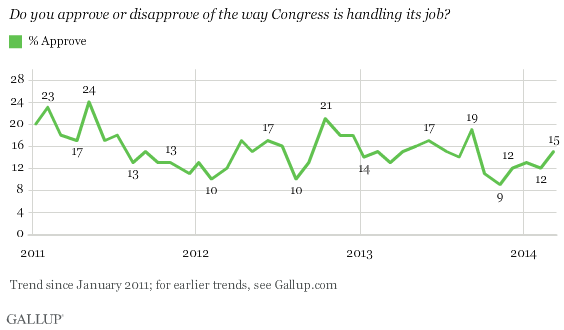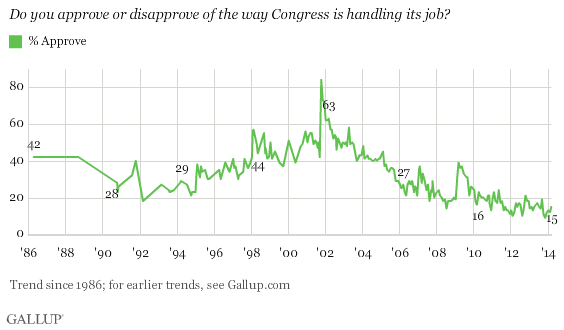PRINCETON, NJ -- With the 2014 midterms now eight months away, 15% of Americans approve of the overall job Congress is doing. This is slightly better than last month's 12%, but extends a nearly steady string of sub-20% approval ratings for Congress that started in mid-2011.

The latest reading is based on a March 6-9 Gallup poll. The survey was conducted as members of Congress, from House Speaker John Boehner to Sen. John McCain, have been promoting tough measures against the Russian government for its actions in Ukraine's Crimean peninsula.
Consistent with the pattern since shortly after the 2010 midterms that resulted in a divided Congress, few Republicans (14%), Democrats (16%), or independents (13%) now applaud the job Congress is doing.
2014 Midterms Feature Low Congress Approval but Divided Control
Congress' current approval rating is technically the lowest Gallup has recorded in March of any midterm year, although it nearly matches Congress' 16% approval rating in March 2010. In the midterms that year, the Democrats suffered enormous U.S. House losses, but Democrats controlled both houses of Congress going into the election. Today, with Republicans in the majority in the U.S. House and Democrats leading the Senate, both parties could be vulnerable to anti-incumbent fervor.

In fact, 2014 is the only example in modern times of a midterm election in which there is a divided Congress and a Democratic president. There have been three midterm elections in which a divided Congress faced the voters under a Republican president: 1982 and 1986 with Ronald Reagan, and 2002 with George W. Bush.
The 1986 midterms may seem most similar to this year's elections -- the Republicans, under a second-term Reagan, held a small majority in the Senate and many of the vulnerable Senate Republicans had been elected in Reagan's 1980 landslide presidential victory. Reagan was far more popular than Obama at this point in his presidency; his approval rating in March 1986 was in the 60s, compared with Obama's ratings in the mid-40s. Yet despite Reagan's robust approval rating, his party suffered a net loss of eight seats and control of the chamber, which can't be reassuring for Democrats today.
Based on approval ratings alone, Reagan's first-term midterm elections in 1982 may be the most similar to this year's elections. Reagan at that time had middling approval ratings -- with a struggling economy abetting his relative unpopularity. Reagan's party was hit hard in the U.S. House races, with Democrats picking up 26 seats. But the Republicans held on to the Senate at least partly because more Democratic senators, though in the minority, were subject to re-election than GOP members. In 2014, it is the president's party -- the Democrats -- who must defend a disproportionate number of Senate seats.
The 2002 midterm elections are a historical anomaly, occurring soon after the Sept. 11 terrorist attacks and in the run-up to the invasion of Iraq. Though first-term presidents typically see their party lose seats during midterms, Republicans actually won control of the Senate in 2002 and saw their numbers advance in the already GOP-controlled House.
Bottom Line
As Congress has been actively involved in trying to address the political crisis in Ukraine, Americans remain highly critical of the overall job it is doing, with only 15% approving and 83% disapproving. And if it is partisan rancor that has been driving Congress' job ratings into the ground since 2010, last month's drama-free passage of a debt-ceiling increase has done little to ease public concerns.
Incumbents running in November still face a highly skeptical public. And while that should concern both parties, Democrats may be especially vulnerable. While Obama's sub-optimal job approval score is similar to Reagan's in 1982, more members of his party are facing competitive Senate races than was true for Reagan, making Democrats more exposed.
Survey Methods
Results for this Gallup poll are based on telephone interviews conducted March 6-9, 2014, with a random sample of 1,048 adults, aged 18 and older, living in all 50 U.S. states and the District of Columbia.
For results based on the total sample of national adults, the margin of sampling error is ±4 percentage points at the 95% confidence level.
Interviews are conducted with respondents on landline telephones and cellular phones, with interviews conducted in Spanish for respondents who are primarily Spanish-speaking. Each sample of national adults includes a minimum quota of 50% cellphone respondents and 50% landline respondents, with additional minimum quotas by time zone within region. Landline and cellular telephone numbers are selected using random-digit-dial methods. Landline respondents are chosen at random within each household on the basis of which member had the most recent birthday.
Samples are weighted to correct for unequal selection probability, nonresponse, and double coverage of landline and cell users in the two sampling frames. They are also weighted to match the national demographics of gender, age, race, Hispanic ethnicity, education, region, population density, and phone status (cellphone only/landline only/both, and cellphone mostly). Demographic weighting targets are based on the most recent Current Population Survey figures for the aged 18 and older U.S. population. Phone status targets are based on the most recent National Health Interview Survey. Population density targets are based on the most recent U.S. census. All reported margins of sampling error include the computed design effects for weighting.
In addition to sampling error, question wording and practical difficulties in conducting surveys can introduce error or bias into the findings of public opinion polls.
View survey methodology, complete question responses, and trends.
For more details on Gallup's polling methodology, visit www.gallup.com.
